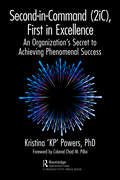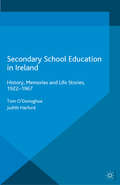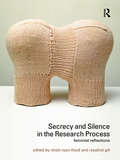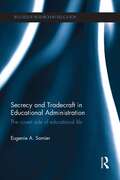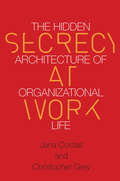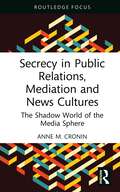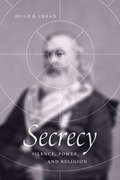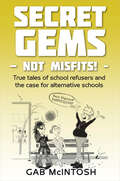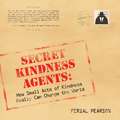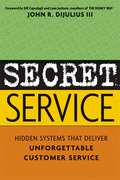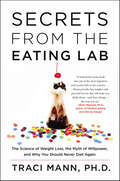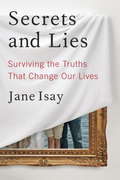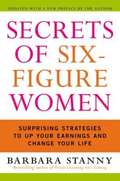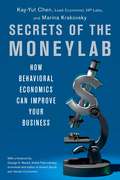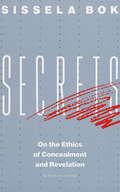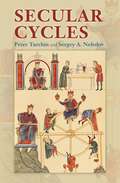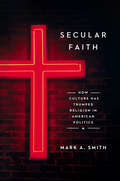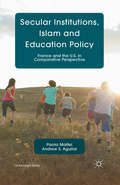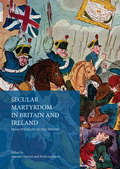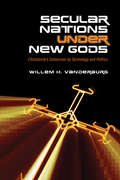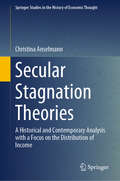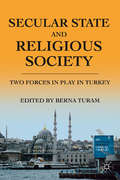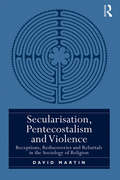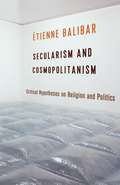- Table View
- List View
Second-Wave Millennials: Tapping the Potential of America's Youth
by Warren WrightAuthor Warren Wright takes you on an engaging journey through the generations in the workplace, starting with “Dave” the Boomer, and ending with the newest kid on the block—“Samanthe”, a Second-Wave Millennial. Page-turning narrative peppered with practical solutions tells the compelling story of how different generations can get along in the workplace—with an emphasis on tapping the potential of the newest generation—Second-Wave Millennials. Second-Wave Millennials reveals: 5 ways to craft an ideal workplace for all generations 4 lifestyle themes that make up Millennials’ identity The top soft skills required for the newly-hired Second-WaveMillennials
Second-in-Command (2iC), First in Excellence: An Organization's Secret to Achieving Phenomenal Success
by Kristina 'KP' Powers, PhDWhy do some departments, divisions, and organizations soar while others struggle? Watching another team achieve the success you feel yours more rightfully deserves can be incredibly frustrating. However, they might have something you don’t: Seconds-in-Command. Given how many Seconds-in-Command exist in the workforce, it is stunning that there are so few books about them. Organizations can and often do have more than one 2iC; large ones may have hundreds. KP Powers focuses on essential skills that individuals in these positions already possess and can enhance to become an organization’s key to achieving phenomenal success. This book introduces the groundbreaking concept of linking multiple 2iCs to form a Second-in-Command chain. This game-changing technique increases the positive impact that 2iCs can have on organizational and leader success. In today’s world, leaders no longer have the luxury of hiring more people to keep up with a growing workload. The labor shortage and the need to cut costs because of looming economic issues make that impractical. It makes more sense to consider a new organizational framework that includes 2iCs, thus multiplying existing team members’ contributions. This is especially critical in highly regulated fields such as higher education, finance, and health care, where the stakes and penalties are high and unforgiving. Second-in-Command, First in Excellence invites readers to think differently about this critical role. Geared toward leaders who have or want a 2iC as well as 2iCs themselves, this book both demonstrates the value of the 2iC position and serves as a tool for professional development.
Secondary School Education in Ireland: History, Memories and Life Stories, 1922 - 1967 (Historical Studies in Education)
by Tom O'Donoghue Judith HarfordAdopting a life story approach, this book explores the memories of those who attended Irish secondary schools prior to 1967. It serves to initiate and enhance the practice of remembering secondary school education amongst those who attended secondary schools not just in Ireland, but around the world.
Secrecy and Silence in the Research Process: Feminist Reflections (Transformations)
by Rosalind Gill Róisín Ryan-FloodFeminist research is informed by a history of breaking silences, of demanding that women’s voices be heard, recorded and included in wider intellectual genealogies and histories. This has led to an emphasis on voice and speaking out in the research endeavour. Moments of secrecy and silence are less often addressed. This gives rise to a number of questions. What are the silences, secrets, omissions and and political consequences of such moments? What particular dilemmas and constraints do they represent or entail? What are their implications for research praxis? Are such moments always indicative of voicelessness or powerlessness? Or may they also constitute a productive moment in the research encounter? Contributors to this volume were invited to reflect on these questions. The resulting chapters are a fascinating collection of insights into the research process, making an important contribution to theoretical and empirical debates about epistemology, subjectivity and identity in research. Researchers often face difficult dilemmas about who to represent and how, what to omit and what to include. This book explores such questions in an important and timely collection of essays from international scholars.
Secrecy and Tradecraft in Educational Administration: The covert side of educational life (Routledge Research in Education)
by Eugenie A. SamierDuring the last couple of decades, there has been an expansion in a number of related and overlapping fields producing evidence of covert activities: toxic cultures, destructive leadership styles, micropolitics, ethical problems in organisations and administration, abusive power and authority, and many other topics of dysfunctional management and leadership studies that frequently make reference to secretive and deceptive behaviour. In this book, Eugenie A. Samier draws on a range of disciplines including education, psychology, administration and management studies and organizational theory to provide a comprehensive examination of the ways in which organisational leaders and administrators carry out their roles in a secretive or deceptive manner. Samier presents a theory of covert administration that can be used to: provide an analysis and interpretation of secretive and deceptive activity inform decision-making both theoretically and practically offer a means of diagnosing errant management using secretive and deceptive practices provide a general set of guidelines for determining when clandestine activities may be legitimate and moral. Alongside a detailed presentation of the theory of covert administration, the book explores covert administration in practice, factors leading to it, and the results of attempts to combat its many forms. It will be key reading for researchers and postgraduates with an interest in the field, as well as administrators and policy makers.
Secrecy at Work: The Hidden Architecture of Organizational Life
by Christopher Grey Jana CostasSecrecy is endemic within organizations, woven into the fabric of our lives at work. Yet, until now, we've had an all-too-limited understanding of this powerful organizational force. Secrecy is a part of work, and keeping secrets is a form of work. But also, secrecy creates a social order--a hidden architecture within our organizations. Drawing on previously overlooked texts, as well as well-known classics, Jana Costas and Christopher Grey identify three forms of secrecy: formal secrecy, as we see in the case of trade and state secrets based on law and regulation; informal secrecy based on networks and trust; and public or open secrecy, where what is known goes undiscussed. Animated with evocative examples from scholarship, current events, and works of fiction, this framework presents a bold reimagining of organizational life.
Secrecy in Public Relations, Mediation and News Cultures: The Shadow World of the Media Sphere (Routledge Focus on Media and Cultural Studies)
by Anne M. CroninThis book investigates the relationship of secrecy as a social practice to contemporary media, news cultures and public relations. Drawing on Georg Simmel’s theorisation of how secrecy produces a ‘second world’ alongside the ‘obvious world’ and creates and reshapes social relations, Anne Cronin argues for close analysis of the PR industry as a powerful vector of secrecy and an examination of its relationship to news cultures. Using case studies and in-depth interviews, as well as recent research in media and cultural studies, sociology, journalism studies and communication studies, the book analyses how PR practices generate a second, shadow world of the media sphere which has a profound impact on the ‘obvious world’. It interrogates both the PR industry’s and news culture’s role in shaping social relations for a digital media landscape, and those initiatives promoting transparency of data and decision-making processes. An insightful, interdisciplinary approach to debates on media and power, this book will appeal to students of public relations, sociology, media studies, cultural studies and communication studies. It will also be of interest to scholars and practitioners working at the intersections of media, social relations and public trust.
Secrecy: Silence, Power, and Religion (Routledge Handbooks In Religion Ser.)
by Hugh B. UrbanThe powers of political secrecy and social spectacle have been taken to surreal extremes recently. Witness the twin terrors of a president who refuses to disclose dealings with foreign powers while the private data of ordinary citizens is stolen and marketed in order to manipulate consumer preferences and voting outcomes. We have become accustomed to thinking about secrecy in political terms and personal privacy terms. In this bracing, new work, Hugh Urban wants us to focus these same powers of observation on the role of secrecy in religion. With Secrecy, Urban investigates several revealing instances of the power of secrecy in religion, including nineteenth-century Scottish Rite Freemasonry, the sexual magic of a Russian-born Parisian mystic; the white supremacist BrüderSchweigen or “Silent Brotherhood” movement of the 1980s, the Five Percenters, and the Church of Scientology. An electrifying read, Secrecy is the culmination of decades of Urban’s reflections on a vexed, ever-present subject.
Secret Gems - not Misfits!: True tales of school refusers and the case for alternative schools
by Gab McIntoshQuirky learning and unexpected happiness for school refusers at alternative schools - really? Who would have thought that school refusers turn out to be secret gems rather than sad misfits? The reader learns how the principal began her alternative schools with no money, no teaching resources, no premises, and few guidelines. One trained teacher; she was it. The only truly dependable resource was unhappy school kids, more than anyone expected. The results are both surprising and delightful. “Secret Gems - not Misfits! True tales of school refusers and the case for alternative schools” puts forwards the case for alternative schools and why they are so desperately needed all over the country. In an age where teachers are leaving their profession in droves, where kids academic results seem to stagnate, or plummet, alternative schools provide a refreshing insight into how we can do schooling differently and make education enjoyable again for teachers, parents and all kids, but particularly those kids called to the beat of a drum.
Secret Kindness Agents: How Small Acts of Kindness Really Can Change the World
by Ferial PearsonMoved by the Sandy Hook Elementary School tragedy, Ferial Pearson wondered if a simple act of kindness could change a life. She thought of the school where she taught and the students she guided every day and wondered, what would happen if we started secretly carrying out small acts of kindness in school? Could a modest act of compassion really change the course of a life? She posed the question to her students. They didn't have the answers but they were willing to find out. And so they became the Secret Kindness Agents. They not only changed the lives of those they met, they changed their own. Their hope, their hearts, and their hunger for happiness will inspire you to change your small corner of the world, in your own way, for the better. Let them show you how they did it, and how you can do the same.
Secret Service: Hidden Systems That Deliver Unforgettable Customer Service
by John DiJuliusAll businesses have customers, but how many of them deliver unforgettably good customer service?Customer experience expert and author John R. DiJulius reveals the hidden systems of the few exceptional companies that do: what actions they take behind the scenes to consistently surpass customer expectations. These organizations reap the benefits of greater customer loyalty, exponentially expanded referral networks, lower employee turnover, and stronger bottom-line results.Packed with examples applicable to a wide range of industries, Secret Service provides practical, realistic ways to:Turn customer complaints into positive experiences,Use marketing to go deeper with existing customers,Increase customer and employee retention,and turn bland customer service into truly memorable customer experiences.By quantifying and examining each phase of the "Customer Experience Cycle," Secret Service reveals clever, practical ideas that can be transformed into repeatable best practices in any organization and at every level.
Secrets From the Eating Lab: The Science of Weight Loss, the Myth of Willpower, and Why You Should Never Diet Again
by Traci MannA provocative expose of the dieting industry from one of the nation’s leading researchers in self-control and the psychology of weight loss that offers proven strategies for sustainable weight loss.From her office in the University of Minnesota’s Health and Eating Lab, professor Traci Mann researches self-control and dieting. And what she has discovered is groundbreaking. Not only do diets not work; they often result in weight gain. Americans are losing the battle of the bulge because our bodies and brains are not hardwired to resist food—the very idea of it works against our biological imperative to survive.In Secrets From the Eating Lab, Mann challenges assumptions—including those that make up the very foundation of the weight loss industry—about how diets work and why they fail. The result of more than two decades of research, it offers cutting-edge science and exciting new insights into the American obesity epidemic and our relationship with eating and food.Secrets From the Eating Lab also gives readers the practical tools they need to actually lose weight and get healthy. Mann argues that the idea of willpower is a myth—we shouldn’t waste time and money trying to combat our natural tendencies. Instead, she offers 12 simple, effective strategies that take advantage of human nature instead of fighting it—from changing the size of your plates to socializing with people with healthy habits, removing “healthy” labels that send negative messages to redefining comfort food.
Secrets and Lies
by Jane IsayBy the author of Walking on Eggshells, a compellingly readable journey into the realm of family secrets, offering lessons and insights for those who are hiding the truth and those who discover what has long been hidden. Secrets, large and small, are a fact of human life. This book explores the impact of keeping secrets and the power of truth. Secrets can damage our sense of self and our relationships. Even so, Jane Isay has found, people survive learning the most disturbing facts that have been hidden from them. And secret keepers are relieved when they finally reveal themselves--even the things they are ashamed of--to the people they care about. Much depends, Isay writes, on the way of telling and the way of hearing. Jane Isay was both a secret finder and a secret keeper. After fifteen years of marriage her husband admitted he was gay, but together they decided to keep it a secret for the sake of their two sons. Building on her personal experience, sixty intimate interviews, and extensive research into the psychology of secrets, Isay shows how the pain of secrets can be lightened by full disclosure, genuine apology, and time. Sometimes the truth sunders relationships, but often it saves them. Powered by detailed stories and Isay's compassionate analysis, Secrets and Lies reveals how universal secrets are in families. The big ones--affairs, homosexuality, parentage, suicide, abuse, hidden siblings--can be ruinous at first, but the effects need not last forever, and Isay shows us what makes the difference. With specific guidelines for those who keep secrets and those who find them out, Isay's book reveals the art of surviving a secret.
Secrets of Six-Figure Women: Surprising Strategies to Up Your Earnings and Change Your Life
by Barbara Stanny<p>According to the Department of Labor, the average woman in 1998 was bringing home less than $25,000 a year. For every dollar that a man makes, a woman makes between 50 and 75 cents, and that is hardly news. <p>But what you may not know is that, quietly and steadily, the number of women making six figures or more is rapidly increasing. Currently, over fifteen million women make $100,000 or more, and the number continues to rise at a rate faster then for men. And these women come from every industry - psychologists, dot com founders, consultants, freelance writers, and even part-timers. <p>What makes these particular women able to do so well in the workplace? Fueled by curiosity, Barbara Stanny, author of <i>Price Charming Isn't Coming: How Women Get Smart About Money</i>, set out to research this phenomenon. What she discovered was that, though the high-earning women she interviewed came from different backgrounds and had had greatly different work experiences, they all had certain characteristics in common. <p><i>Secrets of Six Figure Woman: Surprising Strategies of the Successful High Earners</i> will be a ground breaking book for high earners who want to ensure their wealth, enhance their success, and learn from others who are in the same boat. It will also offer inspiration, guidance, and motivation to those who aspire to make more.</p>
Secrets of the Moneylab
by Kay-Yut Chen Marina KrakovskyTaking the findings of behavioral economics from the cocktail party to the boardroom. Experimental economist Kay-Yut Chen leads an economics lab at Hewlett- Packard-the first of its kind at any company. His groundbreaking research into human behavior has turned into tangible results for HP. He has saved the company millions of dollars, simply by explaining why people really do the things they do. MoneyLab offers practical lessons being put to use right now at HP and other leading companies. It explains, for instance, how to: ? Use incentives to influence employees, suppliers, and buyers ? Determine whom to trust, and how much ? Reduce the negative effects of irrational behavior by noticing patterns that don't seem logical ? Take advantage of the human tendency to game the system In the spirit of Predictably Irrational, but with a more practical approach, Chen shows how to translate the findings of behavioral economics into concrete actions to achieve new levels of success.
Secrets: On the Ethics of Concealment and Revelation
by Sissela BokThe author of Lying shows how the ethical issues raised by secrets and secrecy in our careers or private lives take us to the heart of the critical questions of private and public morality.
Secular Cycles
by Peter Turchin Sergey A. NefedovMany historical processes exhibit recurrent patterns of change. Century-long periods of population expansion come before long periods of stagnation and decline; the dynamics of prices mirror population oscillations; and states go through strong expansionist phases followed by periods of state failure, endemic sociopolitical instability, and territorial loss. Peter Turchin and Sergey Nefedov explore the dynamics and causal connections between such demographic, economic, and political variables in agrarian societies and offer detailed explanations for these long-term oscillations--what the authors call secular cycles. Secular Cycles elaborates and expands upon the demographic-structural theory first advanced by Jack Goldstone, which provides an explanation of long-term oscillations. This book tests that theory's specific and quantitative predictions by tracing the dynamics of population numbers, prices and real wages, elite numbers and incomes, state finances, and sociopolitical instability. Turchin and Nefedov study societies in England, France, and Russia during the medieval and early modern periods, and look back at the Roman Republic and Empire. Incorporating theoretical and quantitative history, the authors examine a specific model of historical change and, more generally, investigate the utility of the dynamical systems approach in historical applications. An indispensable and groundbreaking resource for a wide variety of social scientists, Secular Cycles will interest practitioners of economic history, historical sociology, complexity studies, and demography.
Secular Faith: How Culture Has Trumped Religion in American Politics
by Mark A. SmithWhen Pope Francis recently answered "Who am I to judge?" when asked about homosexuality, he ushered in a new era for the Catholic church. A decade ago, it would have been unthinkable for a pope to express tolerance for homosexuality. Yet shifts of this kind are actually common in the history of Christian groups. Within the United States, Christian leaders have regularly revised their teachings to match the beliefs and opinions gaining support among their members and larger society. Mark A. Smith provocatively argues that religion is not nearly the unchanging conservative influence in American politics that we have come to think it is. In fact, in the long run, religion is best understood as responding to changing political and cultural values rather than shaping them. Smith makes his case by charting five contentious issues in America's history: slavery, divorce, homosexuality, abortion, and women's rights. For each, he shows how the political views of even the most conservative Christians evolved in the same direction as the rest of society--perhaps not as swiftly, but always on the same arc. During periods of cultural transition, Christian leaders do resist prevailing values and behaviors, but those same leaders inevitably acquiesce--often by reinterpreting the Bible--if their positions become no longer tenable. Secular ideas and influences thereby shape the ways Christians read and interpret their scriptures. So powerful are the cultural and societal norms surrounding us that Christians in America today hold more in common morally and politically with their atheist neighbors than with the Christians of earlier centuries. In fact, the strongest predictors of people's moral beliefs are not their religious commitments or lack thereof but rather when and where they were born. A thoroughly researched and ultimately hopeful book on the prospects for political harmony, Secular Faith demonstrates how, over the long run, boundaries of secular and religious cultures converge.
Secular Institutions, Islam and Education Policy: France and the U.S. in Comparative Perspective (St Antony's Series)
by P. Mattei A. AguilarAmidst claims of threats to national identities in an era of increasing diversity, should we be worried about the upsurge in religious animosity in the United States, as well as Europe? This book explores how French society is divided along conflicts about religion, increasingly visible in public schools, and shows the effect that this has had.
Secular Martyrdom in Britain and Ireland
by Keith Laybourn Quentin OutramThis edited collection examines the concept and nature of the 'people's martyrology', raising issues of class, community, religion and authority. It examines modern martyrdom through studies of Peterloo; Tolpudd≤ Feathersto≠ Tonypandy; Emily Davison, fatally injured by the King's horse on Derby Day, 1913; the 1916 Easter Rising; Jarrow, 'the town that was murdered, and martyred in the 1930s'; David Oluwale, a Nigerian killed in Leeds in 1965; and Bobby Sands, the IRA hunger striker who died in 1981. It engages with the burgeoning historiography of memory to try to understand why some events, such as Peterloo, Tonypandy and the Easter Rising, have become household names whilst others, most notably Featherstone and Oluwale, are barely known. It will appeal to those interested in British and Irish labour history, as well as the study of memory and memorialization.
Secular Nations under New Gods: Christianity’s Subversion by Technology and Politics
by Willem H. VanderburgThe ongoing political muscle-flexing of diverse Christian communities in North America raises some deeply troubling questions regarding their roles among us. Earlier analyses including Herberg’s Protestant, Catholic, Jew showed that these three branches of the Judaeo-Christian tradition correspond to three forms of the American way of life; while Kruse’s One Nation Under God showed how Christian America was shaped by corporate America. Willem H. Vanderburg’s Secular Nations under New Gods proceeds based on a dialogue between Jacques Ellul’s interpretation of the task of Christians in the world and Ellul’s interpretation of the roles of technique and the nation-state in individual and collective human life. He then adds new insight into our being a symbolic species dealing with our finitude by living through the myths of our society and building new secular forms of moralities and religions. If everything is political and if everything is amenable to discipline-based scientific and technical approaches, we are perhaps treating these human creations the way earlier societies did their gods, as being omnipotent, without limits. Vanderburg argues that until organized Christianity becomes critically aware of sharing these commitments with their societies, it will remain entrapped in the service of false gods and thereby will continue to turn a message of freedom and love into one of morality and religion.
Secular Stagnation Theories: A Historical and Contemporary Analysis with a Focus on the Distribution of Income (Springer Studies in the History of Economic Thought)
by Christina AnselmannIn light of weak economic performances and rising income disparities across the developed world during the past decades, this book provides a comprehensive overview of secular stagnation theories in the history of economic thought and examines the role of income distribution in various stagnation hypotheses. By offering a historical perspective, from the classical economists to the most recent stagnation debate of the early twenty-first century, the author shows that most stagnation theories were developed in periods of high and/or rising income disparities. Eventually, it was Josef Steindl, one of the least recognized stagnationists in the history of economic thought, who put the distribution of income at the heart of his stagnation theory. While Josef Steindl focused on the nexus between the functional distribution of income and economic growth, this book includes the personal distribution of income in a Kaleckian-Steindlian model of economic growth and stagnation. In the model presented, the nexus between economic growth and the distribution of income is a priori uncertain, depending on the type of economic shock and the specific economic circumstances. The author also discusses various empirically oriented policy implications aimed at fostering both economic growth and a more equal distribution of income. This book appeals to scholars in economics and the history of economic thought interested in economic growth, secular stagnation, and income distribution.
Secular State and Religious Society: Two Forces in Play in Turkey
by Berna TuramOn the basis of original, empirically rich, and theoretically sound social research, the chapters in this volume reveal and analyze the complex relations between the secular government of Turkey and the religious persons and society within the Turkish state.
Secularisation, Pentecostalism and Violence: Receptions, Rediscoveries and Rebuttals in the Sociology of Religion
by David MartinIn this book David Martin brings together a coherent summary of his many years of ground-breaking academic work on the sociology of religion. Covering key and contentious areas from the last half-century such as secularisation, religion and violence, and the global rise of Pentecostalism, it presents a critical recuperation of these themes, some of them first initiated by the author, and a review of their reception history. It then reviews that reception history in a way that discusses not only the subjects themselves, but also the academic practices that have surrounded them. As such, this collection is vital reading for all academics with an interest in David Martin’s work, as well as those involved with the sociology of religion and the study of secularisation more generally.
Secularism and Cosmopolitanism: Critical Hypotheses on Religion and Politics (European Perspectives: A Series in Social Thought and Cultural Criticism)
by Étienne BalibarWhat is the relationship between cosmopolitanism and secularism—the worldwide and the worldly? While cosmopolitan politics may seem inherently secular, existing forms of secularism risk undermining the universality of cosmopolitanism because they privilege the European tradition over all others and transform particular historical norms into enunciations of truth, valid for all cultures and all epochs. In this book, the noted philosopher Étienne Balibar explores the tensions lurking at this troubled nexus in order to advance a truly democratic and emancipatory cosmopolitanism, which requires a secularization of secularism itself.Balibar argues for the idea of the universal against its particular dominant institutions. He questions the assumptions that underlie popular ideas of secularism and religion and outlines the importance of a new critique for the contemporary world. Balibar holds that conflicts between religious and secular discourses need to be reframed from a point of view that takes into account the cultural hybridization, migration and mobility, and transformation of borders that have reshaped the postcolonial age. Among the topics discussed are the uses and misuses of the category of religion and the religious, the paradoxical genealogy of monotheism, French laïcité’s identitarian turn, and the implications of the responses to the Charlie Hebdo attacks for an extended definition of free speech. Going beyond circumscribed notions of religion and the public sphere, Secularism and Cosmopolitanism is a profound rethinking of identity and difference that seeks to make room for a renewed political imagination.

